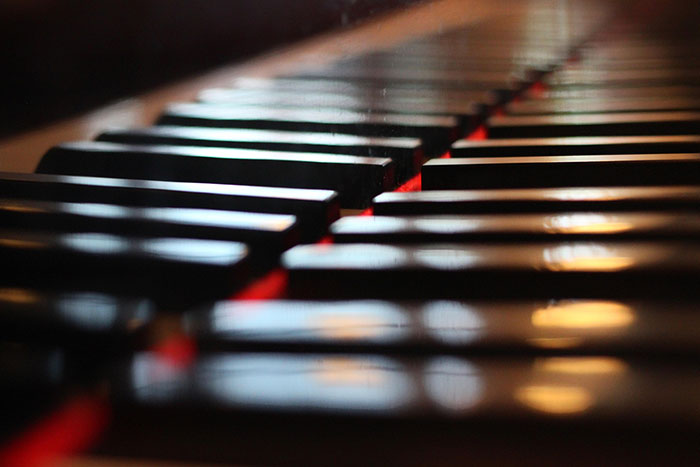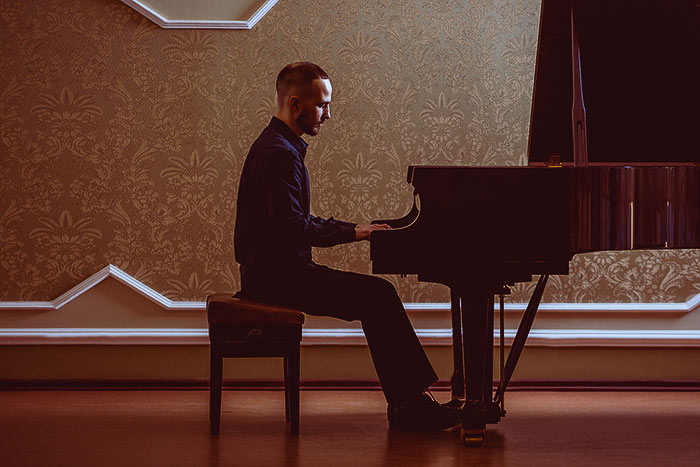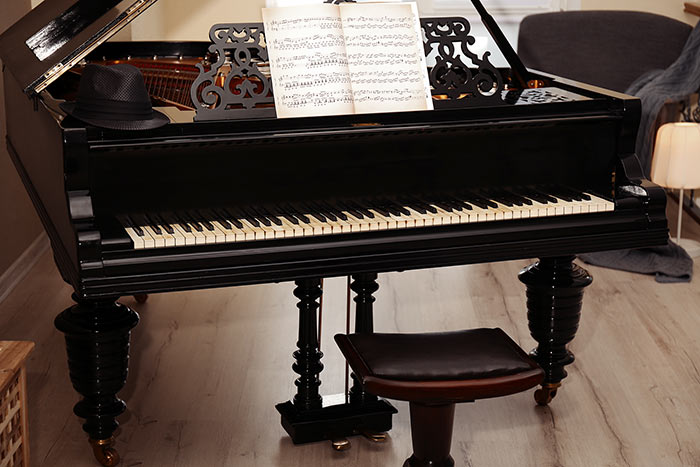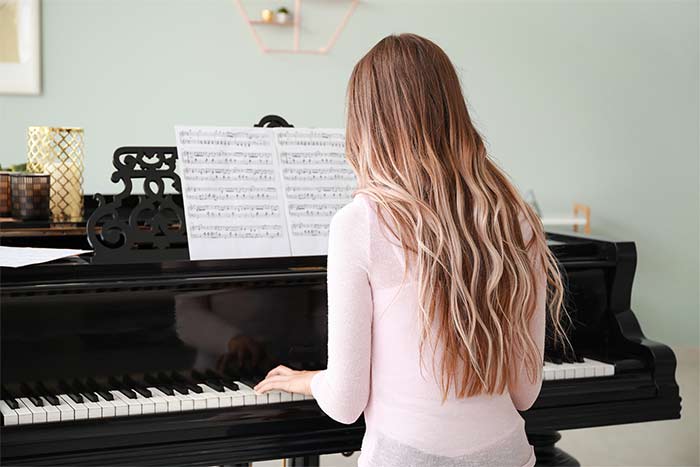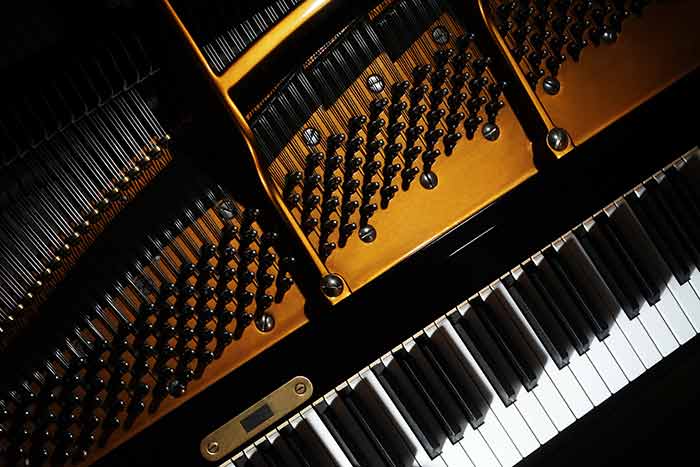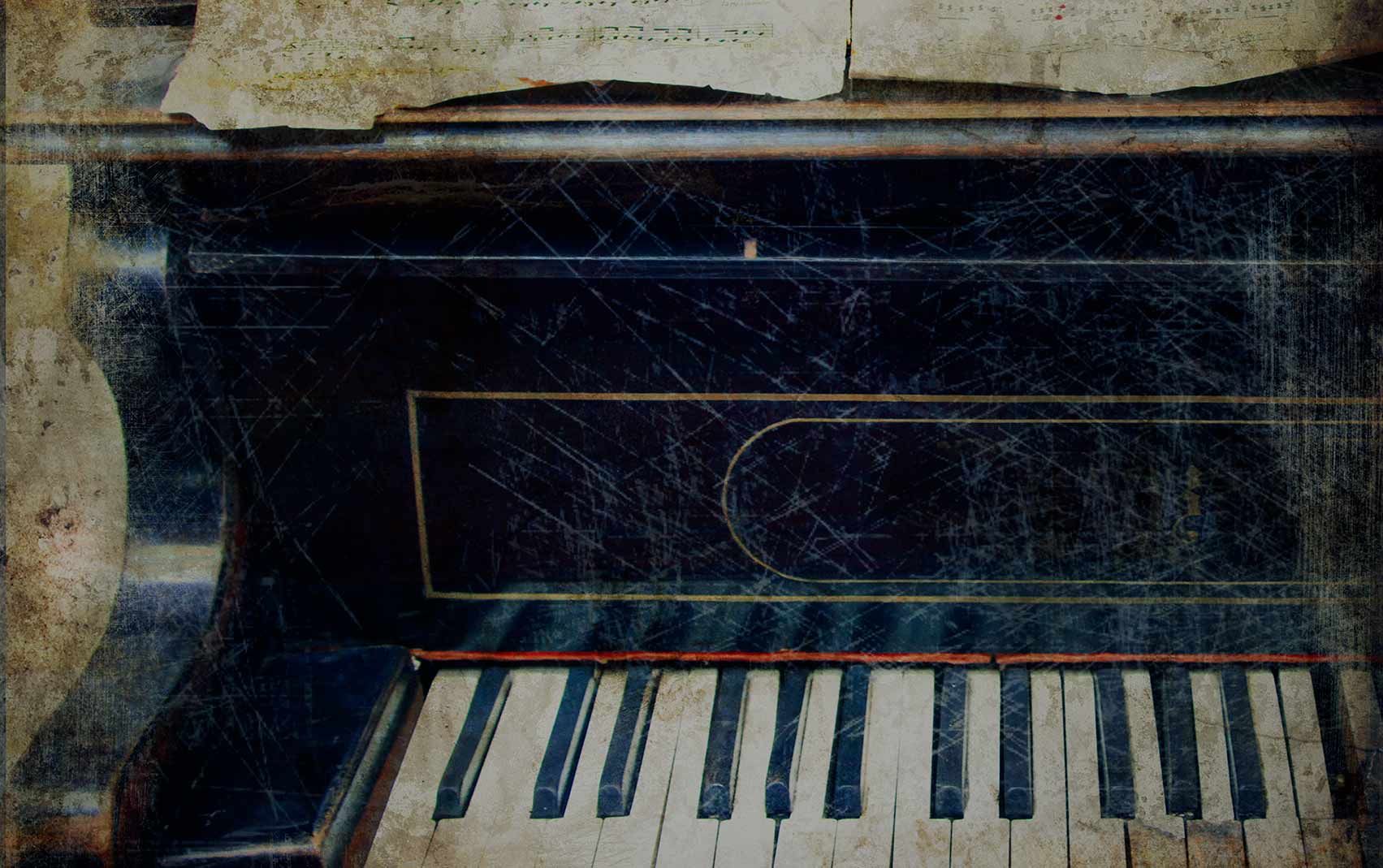Andy Barge: How did you get into music?
Celine Gaurier-Joubert: My parents are both amateur musicians so playing music was the obvious thing to do. As my father is an amateur violinist, I started to play the violin at 3 years old. I did not have much interest in it but discovering Chopin 1st concerto for piano at age 4 lighted a passion for this instrument. I started straight away and I was delighted with my choice.
Andy Barge: What is the most common mistake that a beginner makes?
Celine Gaurier-Joubert: Most beginners think that playing the piano proficiently is relatively easy. They see it as a task that could be completed fairly quickly. They get frustrated at the first set back. They either lose interest at the first difficulty or try and hide their shortcomings by using some tricks. They do not realise that mastering piano playing takes years and hours of practice.
The most frustrated students I have met were often very successful in their career as bankers, lawyers or insurance brokers. They could not accept to struggle with a task that they thought required much less intelligence.
When starting your piano education, you should expect to have to take lessons for years as piano playing is a journey and not a destination. Remember that it is complex and that the world’s best pianists were not born on the stage of the Carnegie Hall.
Andy Barge: What would you say to someone who thinks they are too old to start playing the piano?
Celine Gaurier-Joubert: I would ask them some questions in return:
Why would you be too old? Why would it be too late to start a hobby? Is it ever too late to start playing golf or gardening? No, it isn’t so why would there be an age limit to start playing the piano? You are not aiming to become a concert pianist anyway so why would it ever be too late to start playing some exquisite simple pieces?
Andy Barge: When buying a first piano as a beginner – what should I go for?
Celine Gaurier-Joubert: It depends on your budget, space and ability to make noise. There is no such thing as a piano for a beginner. I often hear beginners saying “I have bought a cheap keyboard as I am a beginner. I do not need a grand piano.” Actually, you do! We all need to play on the best instruments at any stage of our development as it makes the experience much more enjoyable. I do not know if you ski but if you do, did you go for the worse equipment on the basis that you are not a professional skier? I don’t believe so.
Andy Barge: What can I expect in my first lesson with the London Piano Institute?
You can expect to be welcomed by a brilliant pianist who has a passion for teaching adult amateur pianists. He/she will ask you some basic questions i.e why you have decided to start a piano course and how much time you can dedicate to personal practice to figure out which teaching method is most suitable for you. He/she will then teach you how to read a few music notes and rhythms for you to start playing your first tune straight away.
Andy Barge: What is the most important skill to learn as a new player?
Celine Gaurier-Joubert: Learning how to read music. It is the most important skill to learn since it will allow you, in the future, to take any music sheet and sight-read a piece for pleasure without having to practise it first. It will also speed up your learning of any new piece of the repertoire. Not being fluent in music reading will result in you struggling and stumbling. Having to focus on decrypting the music sheet takes your mind away from the most important aspect of piano playing, which is making music.
Andy Barge: There are lots of videos on YouTube teaching piano, can you learn by doing this?
Celine Gaurier-Joubert: No, it isn’t. It is possible to pick up some tips and ideas, but you cannot learn how to play the piano by watching videos on YouTube. Playing the piano is a complex art and science that requires the support and guidance of an expert and personal tutoring based on your faults and qualities. My advice would be to stay away from YouTube as listening to tutorial videos that are not necessarily appropriate or suitable might confuse you. Trust your piano teacher and follow his/her advice fully. Staying in a straight line is undoubtedly the most secure way to achieve your goals.
Andy Barge: What tips can you give to keep people motivated?
Celine Gaurier-Joubert: Keep going and do not check your progress weekly. Checking too often is the best way to engineer disappointment. As I said earlier, it takes years to become a proficient pianist. We all have setbacks, and we all experience plateaux. My late master piano teacher Edson Elias always told us that it is during the periods of doubts and unsatisfaction that we make the most progress. It is very true! Keep your eyes on the price but focus on your progress in the short term and do not give up. When you think that it is not going anywhere, look back. You will surely realise that you are doing much better than you thought!
Andy Barge: How much should a beginner be practising a day?
Celine Gaurier-Joubert: It depends on the amount of homework to be completed from a week to another and on the exact level you are at. If you have just started, 15 minutes is fine, but it should increase to 30 minutes quite quickly. If you study with a good piano teacher, you should expect to have to practise technical exercises, sight-reading and pieces of the repertoire daily.
Andy Barge: If someone says they don’t have time to practise – what do you advise?
Celine Gaurier-Joubert: I would advise them to stop their piano lessons as they are wasting their time. When learning how to play the piano, attending lessons and practising in between are equally important. You should see your piano lessons as a moment for you to get feedback and learn further but it is not in the piano class that you are making progress. I often tell my pupils that I feel like a doctor giving a new prescription when I write the homework down. Think of it that way: You will get better by taking your pills daily and not by visiting your GP.
Andy Barge: What should I look for in a prospective piano teacher?
Celine Gaurier-Joubert: Ensure that they have lots of experience in teaching adults, that they are qualified for doing so and that, most importantly, they have a passion for passing their knowledge on. They should also be very approachable as you want to feel free to ask all the questions you may have and make the most “silly” mistakes without ever feeling embarrassed.
Andy Barge: What do you enjoy about being a piano teacher?
Celine Gaurier-Joubert: Seeing my pupils grow musically and develop a better understanding of the instrument. I always marvel when a student has learnt the notes of a new piece perfectly and it is time to add the music and interpretation onto it. We have the foundation or a canvas to work on if you prefer, and witnessing the improvement weeks after weeks is thrilling. I love sharing my love for piano playing and opening my students’ minds as beginners do not always understand what it is all about. They are satisfied when they play the notes correctly without realising that it is not what they should be after. Piano playing is about understanding the meaning of a piece and using both our technical and musical skills to express the wish of the composer. It is not about playing the right notes at the right time.
Sharing my experiences and seeing my students flourish is both immensely rewarding and enjoyable.
Andy Barge: Can I learn to play “by ear” and not have to learn how to read music?
Celine Gaurier-Joubert: You can but it is not advised. I often compare music to a foreign language. Can you learn German by listening to conversations and try to repeat what you have heard? It can work for easy words such as Guten tag, Danke or Auf Wiedersen but it won’t take you very far. Understanding music theory and being able to read music are essential skills that you should neither skip nor ignore.
Andy Barge: Sometimes when I am playing, my mind wanders – how can I keep focus?
Celine Gaurier-Joubert: It is a common issue among musicians. It happened to me countless times. If your mind wanders while practising, take a few-minute break as it might mean that you stayed too long at the piano. While performing, ensure that you are active at all times and that you are not playing in this passive manner. Thinking about something else while practising is a waste of your time. While playing for your teacher or an audience, it results in very poor performance.
Do you usually think about something else while talking to somebody? You don’t as your speech would be meaningless. It is the same with piano playing.
By controlling your sound and technical productions at all times, you should be able to remain active and prevent it to happen.
Andy Barge: I only have 15 minutes to practise today – what one thing should I do?
Celine Gaurier-Joubert: It depends. You could use these 15 minutes as a maintaining session, an opportunity to solve a technical issue or improve your sight-reading.
Andy Barge: What kind of music do you like to play yourself?
Celine Gaurier-Joubert: I enjoy most composers from the 20th century as I am fascinated by the various sound effects and the freedom that accompanies their compositions.


